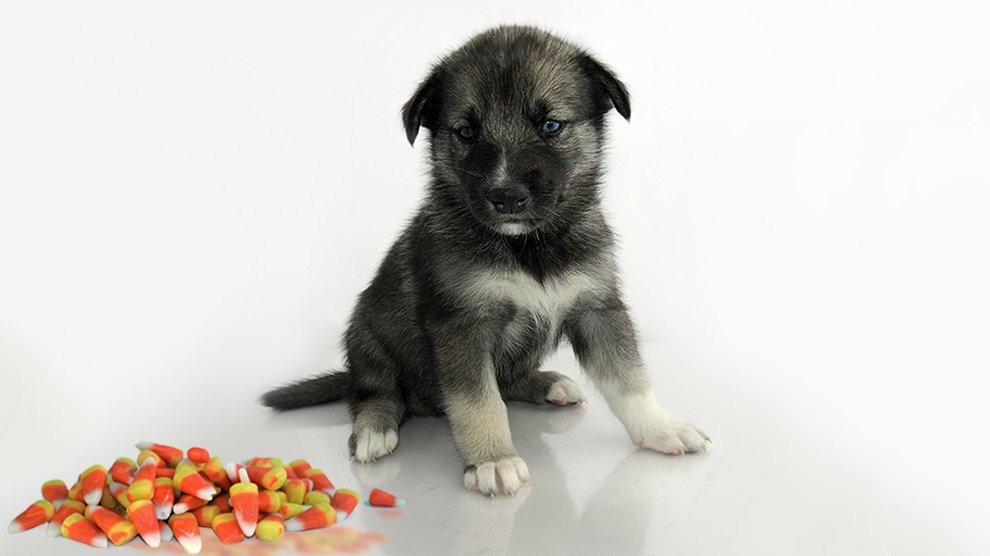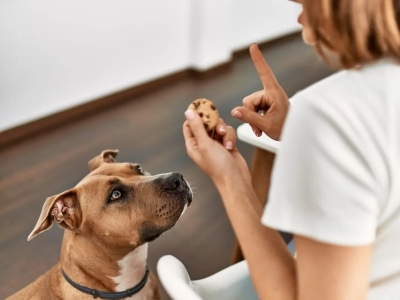As a responsible pet owner, you’re likely cautious about what foods and ingredients you offer your furry friend.
Maltitol, a sugar substitute often found in sugar-free and “diabetic-friendly” products, might have caught your attention.

But before sharing any treat with your beloved canine companion, it’s crucial to understand the potential effects of maltitol on dogs’ health.
Let’s delve into the topic and uncover whether maltitol is safe for dogs to consume.
Contents
- What is Maltitol?
- Is Maltitol Safe for Dogs?
- The Side Effects of Maltitol for Dogs
- How Much Maltitol Is Too Much for Dogs?
- How to Prevent Maltitol Poisoning in Dogs
- Consulting a Veterinarian
- FAQs
- Can dogs eat products sweetened with maltitol in moderation?
- Is maltitol toxic to dogs like xylitol?
- Are there specific dog breeds that are more sensitive to maltitol?
- Are there safer alternatives to maltitol-containing treats?
- Are there any long-term health risks associated with feeding maltitol to dogs?
- Conclusion
What is Maltitol?
Maltitol is a sugar alcohol commonly used as a sugar substitute in various foods, including sugar–free candies, baked goods, and diabetic–friendly products.

It’s favored for its sweet taste and reduced calorie content compared to sugar.
Maltitol is often used to create products that are safe for people with diabetes and those looking to reduce their sugar intake[1].
Is Maltitol Safe for Dogs?
Maltitol is not considered safe for dogs and should be avoided.
While it might be used as a sugar substitute for humans, it can have adverse effects on canine health.
Dogs metabolize substances differently than humans, and their digestive systems may struggle to process sugar alcohols like maltitol[2].

Consumption of even small amounts of maltitol can lead to gastrointestinal distress in dogs, including symptoms like vomiting, diarrhea, bloating, and discomfort.
In some cases, ingestion of maltitol-containing products can even lead to more serious conditions, such as hypoglycemia (low blood sugar) or metabolic disturbances[3].
To ensure the well-being of your dog, it’s crucial to keep foods and products containing maltitol or other sugar alcohols out of their reach and to stick to dog–safe treats and foods recommended by veterinarians[4].
If you suspect your dog has ingested anything containing maltitol, it’s advised to contact your veterinarian immediately.
The Side Effects of Maltitol for Dogs
Maltitol is not well absorbed by the intestines of dogs, which means it can cause gastrointestinal (GI) distress or diarrhea.
This is because maltitol draws water into the colon and acts as a laxative. It can also cause gas, bloating, cramping, and abdominal pain in some dogs.
The severity of these symptoms depends on the amount of maltitol ingested and the individual sensitivity of the dog.

Some dogs may tolerate small amounts of maltitol without any issues, while others may react to even a tiny dose.
Similar to xylitol, maltitol can have an impact on a dog’s blood sugar levels. Blood sugar levels can rise slowly with maltitol, whereas they can rise quickly with xylitol.
This is due to the liver’s gradual metabolism and conversion of maltitol into glucose.
For dogs who have diabetes or insulin resistance, this may be an issue since it may affect how well they control their blood sugar levels and take their medications.
How Much Maltitol Is Too Much for Dogs?
There is no definitive answer to how much maltitol is too much for dogs, as different dogs may have different reactions to it.
However, some general guidelines are:
- The safe daily dose of maltitol for dogs is thought to be about 0.3 grams per kilogram of body weight.
This indicates that a 10-kg dog can safely eat around 3 grams of maltitol per day, which is comparable to roughly one teaspoon of maltitol syrup or two pieces of sugar-free gum.

- Dogs should take around 0.5 grams of maltitol per kilogram of body weight each day as a laxative.
This implies that if a 10-kg dog consumes more than 5 grams of maltitol per day—roughly two tablespoons of maltitol syrup or four pieces of sugar-free gum—they may have diarrhea.
- The toxic dose of maltitol for dogs is unknown, but it is likely to be much higher than the laxative dose.
However, consuming excessive amounts of maltitol can cause dehydration, electrolyte imbalance, hypovolemia (low blood volume), and hypotension (low blood pressure) in dogs[5].
These conditions can be life-threatening if not treated promptly.
How to Prevent Maltitol Poisoning in Dogs
The best way to prevent maltitol poisoning in dogs is to avoid giving your dog any products that contain maltitol or any other artificial sweeteners.
Always read the labels of the food and non-food items in your home and keep them out of your dog’s reach.

Some common sources of maltitol are:
- Sugar-free candies, chocolates, cookies, cakes, ice cream, and other desserts
- Sugar-free chewing gum, mints, breath fresheners, and lozenges
- Sugar-free cough syrups, tonics, and vitamin preparations
- Sugar-free toothpaste, mouthwash, dental floss, and oral care products
- Sugar-free peanut butter, jam, jelly, and other spreads
If you suspect that your dog has ingested maltitol or any other artificial sweetener,
- Contact your veterinarian immediately or call a pet poison helpline.
- Do not induce vomiting unless instructed by a professional.
- Provide your dog with plenty of water and monitor their symptoms closely.
Consulting a Veterinarian
Before introducing any new ingredient into your dog’s diet, it’s crucial to consult with a veterinarian.
Every dog is unique, and what might be well tolerated by one could cause issues in another.

If you’re considering sharing a treat containing maltitol with your furry friend, here are some steps to consider:
- Read Labels
Always read ingredient labels carefully to determine if a product contains maltitol or any other sugar substitute.
- Moderation
If your veterinarian approves, consider introducing a very small amount of a maltitol-containing treat to gauge your dog’s reaction.
Monitor closely for any signs of gastrointestinal distress.
- Alternative Treats
Opt for treats that use safer, dog–friendly ingredients.
There are numerous natural and commercially available treats specifically formulated for dogs.
- Consultation
If your dog has diabetes or other health conditions, it’s especially important to consult your veterinarian before offering any treats or foods that contain maltitol.
FAQs
Can dogs eat products sweetened with maltitol in moderation?
While some dogs might tolerate small amounts of maltitol without issue, it’s important to remember that dogs’ digestive systems differ from humans.
It’s recommended to consult a veterinarian before introducing any new ingredient into your dog’s diet, even in moderation.
Is maltitol toxic to dogs like xylitol?
Maltitol is not as toxic to dogs as xylitol, which can be extremely dangerous even in small amounts.
However, maltitol can still cause digestive upset and other issues in dogs, so it’s wise to exercise caution.
Are there specific dog breeds that are more sensitive to maltitol?
Sensitivity to maltitol can vary widely among individual dogs and might not necessarily be linked to specific breeds.
Factors such as age, overall health, and any pre-existing conditions can play a role in a dog’s tolerance to maltitol.
Are there safer alternatives to maltitol-containing treats?
Yes, there are many dog-friendly treats available that use natural ingredients and are specifically formulated for dogs.
Look for treats that are free from artificial sweeteners and additives.
Are there any long-term health risks associated with feeding maltitol to dogs?
The long-term effects of feeding maltitol to dogs are not well documented.
However, consistent consumption of maltitol-containing treats could potentially lead to ongoing digestive discomfort and other health issues over time.
Conclusion
Maltitol is not toxic to dogs like xylitol, but it can still cause gastrointestinal upset or diarrhea in some dogs.
It can also affect the blood sugar levels of diabetic dogs or dogs with insulin resistance.
Therefore, it is best to avoid giving your dog any products that contain maltitol or any other artificial sweeteners.
Always read the labels of the products in your home and keep them away from your dog’s reach.
If your dog has ingested maltitol or any other artificial sweetener, contact your veterinarian immediately or call a pet poison helpline.
Reference:
- What is Maltitol? | Food Insight
- Understanding Your Dog’s Metabolism | Hill’s Pet
- Hypoglycemia in dogs: Causes, management, and diagnosis | PubMed Central (PMC)
- People Foods Dogs Can and Can’t Eat | American Kennel Club
- Everyday Medicine: Blood Pressure in Dogs and Cats | The Animal Medical Center

Dania is a dog groomer living in California, who loves styling dogs. She often uses dog accessories to keep them distracted while grooming. She is also a dog parent to a Pomeranian, Duke. It’s because of him she is always on a lookout for the best dog foods, toys, other dog accessories, and ways to keep him equipped, healthy and happy.

